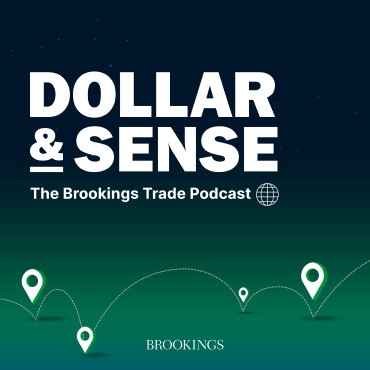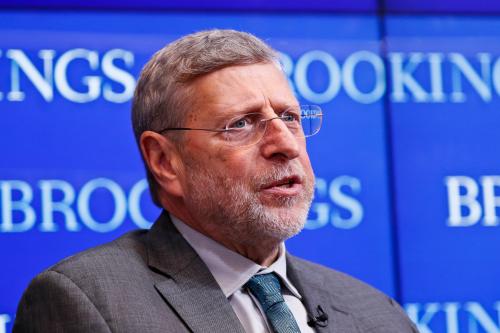David Dollar, the host of Dollar and Sense, passed away on October 6, 2023. In this final episode of his podcast, David’s friends and colleagues pay tribute to his work as a U.S. official and scholar, as a mentor and colleague, as a podcast host, and ultimately as a family man.
Special thanks to Gastón Reboredo, audio/podcast engineer, who worked on the show from the beginning.
TRANSCRIPT
[music]
RYAN HASS: Hello. My name is Ryan Hass. I’m a senior fellow and the director of the John L. Thornton China Center at the Brookings Institution. And today, my job is to be a guest host for the final episode of the Dollar and Sense Podcast. I’m assuming this role today to honor the man behind the program, David Dollar, who passed away on October 6th. In today’s episode, you will hear from several David’s colleagues, from various points in his career about the legacy that he leaves behind.
In his background. David joined Brookings in July 2013 after a decorated career with the World Bank and the U.S. Department of the Treasury. While he was at Brookings, David was enormously productive. He produced countless commentaries, policy briefs, research reports. He also co-edited two books with the Brookings Institution Press.
David also is well known for being the first scholar at Brookings to host his own podcast, Dollar and Sense. He launched the podcast as a way to lift up Brookings Scholars in over the course of 130 episodes over several years, David showcased experts from across the Institution. And his curiosity and joy for learning came through in every episode.
Today, the aptly named Dollar and Sense is a frequent reference among journalists and policymakers. But before I turn the show over to David’s colleagues, let me just say one word about this exceptional man. David was undeniably brilliant. He was a sought after resource for policymakers interested in the evolving dynamics between the United States and China. He was passionate about global development.
But above all, David was dedicated to his friends and foremost to his family. His family was the core of his world. It is what he organized his life around. And this is what I will remember most about my friend, my colleague David Dollar. I hope you enjoy this final tribute to this great man.
[music]
DAVID WESSEL: I’m David Wessel, director of the Hutchins Center on Fiscal and Monetary Policy in Economic Studies at Brookings. David Dollar was the model Brookings scholar. He was always ready to answer a question, no matter how naive about something going on in China or the international economy. When he wasn’t traveling, he was always ready to come and talk to visitors from outside Brookings who came to us to hear something about our expertise or our perspective on the world. And in his Dollar and Sense podcast, he demonstrated something quite valuable and unusual: an intellectual curiosity and an ability to draw people out about the work that they’re doing in ways that ordinary people can understand. We’ll miss him.
[music]
SAMANTHA GROSS: I’m Samantha Gross, director of the Energy Security and Climate Initiative and a fellow in Brookings Foreign Policy. David’s depth of expertise was obvious to everyone who listened to his podcast. But what I don’t think you really get through audio is that he was a truly special person. Warm, kind, and completely unflappable when chaos hit. And also an amazing mentor both to younger staff and a collaborator for all of us here at Brookings.
I had the pleasure of being a guest on Dollar and Sense a few times, and I hope that all of you got the sense of an interesting conversation among friends in the hallway. That was who David was, and I hope that we got to share him with you. I’m heartbroken that he’s gone, but my tribute is to strive and do my best to carry on his best qualities, his kindness and generosity, and his bottomless good nature. But that level of chill, I’ll never achieve that.
[music]
TIM GEITHNER: Hi, I’m Tim Geithner. David Dollar is my favorite American economist on China. My favorite person to talk to about China, to help think about China. We studied China, both studied Chinese at Dartmouth–he did it a little before I did.
I still remember when I took my first trip to China as Secretary of the Treasury in May of 2009, David was then the U.S. financial attaché in Beijing. He called me when I landed and said that there was a congressman running around Beijing at that point telling the Chinese that they should sell their Treasury bonds because we were going to have hyperinflation in the United States, and likely default on our Treasury bonds. Kind of strange thing for a U.S. politician to be saying in China. But David was his measured, calm, balanced, steady self.
He had tremendous credibility with a generation of great policymakers and academics and with a range of Chinese officials he worked with a period of time. I always found him focused on the evidence. Never got caught up in the waves of paranoia or excess excitement, optimism, or excess pessimism that colored this relationship.
I think we’re going to look back at David and his era with a lot of nostalgia as a time not just of reform and opening a China, and greater integration between the U.S. and China, but a sustained effort by officials on both sides to try to build the kind of trust you need to be able to work together, to manage through tensions, and to try to build a framework so that we can coexist peacefully.
So, I had tremendous admiration for him and tremendous respect for him. And it was a privilege for me to be able to work with him.
[music]
DAVID LEVINGER: My name is David Levinger. I had the honor of working with Dave Dollar when I was at the U.S. Treasury Department and he was World Bank country director for China. And later when he was the U.S. Treasury Department’s representative to China. Our family also had the fun of being the Dollar’s neighbors in Beijing. In his home, you could always find good company, good conversation, and good food.
Like others who worked on China, I benefited so much from Dave’s deep knowledge of development and trade, as well as Chinese history and culture. But the most valuable skill I learned from Dave is what I call his superpower. He had this incredible ability to put himself in someone else’s shoes and understand and appreciate their perspective. When providing policy advice he would speak to and with his audience rather than at them. And on the most complex economic issues, he always spoken language that his audience could hear. Not surprisingly, senior government and business officials across the world sought his advice.
Dave’s work was serious, rigorous, and impactful. During China’s reform and opening, hundreds of millions of people were lifted out of extreme poverty. And the World Bank and David Dollar played an important role in that.
But through his actions and demeanor, he also taught many of us not to take ourselves too seriously. Then in economic development and diplomacy, humility goes a long way. And he reminded us that there’s more to life than work, like playing tennis or taking friends on hikes or just taking time to be with family and friends.
Dave always gave more than he received. And so too, in his death, he leaves us not only with a lifetime of memories, but a prolific body of research and wisdom that we can still learn from. And given the current state of U.S.-China relations, his insights are as important as ever.
[music]
KEN LIEBERTHAL: My name is Ken Lieberthal, and I’ve considered David Dollar both a friend and a professional colleague ever since we first met in Beijing 20 years ago when David headed the World Bank’s office there. This Dollar and Sense podcast in David’s honor is so appropriate in part because his podcast series reflected the attributes that made David a beloved colleague at Brookings, a role model professionally, and a go-to person on economic growth and trade issues globally.
Professionally, in more than 130 episodes of his trade podcast, David interviews scholars from across Brookings, the Americas, Asia, Europe and the Global South. He was at home interviewing people of many specialties, talking about diverse topics because he clearly brought to bear a wide ranging intellect, but was also a very good listener. So, every interview became a genuine conversation in which both David and his interviewee appeared to learn from their dialogue. And on every very technical subject, David managed to articulate the issues and terms that a non-expert could readily understand. I was grateful for those podcasts. I learned much from the exemplary way in which he conducted them.
At Brookings, David’s door was always open. He participated in innumerable Brookings events. He was a prolific writer of short pieces, long papers, and two books, and someone who readily cooperated with myriad Brookings scholars and with counterparts around the world. In all these activities, he possessed a strong center of gravity and reached balanced, realistic assessments. He was very much a professional role model for me, and I’m sure for many others.
But what meant most to me about David were his attributes as a truly remarkable human being. For David Dollar was a genuinely good person, a person of exceptional integrity. He did not wear his integrity on his sleeve, he lived it. Indeed, the adjectives leap to mind when I think about David are that he was knowledgeable, modest, empathetic, articulate, humorous, and fundamentally optimistic about people and their potential. He was, not surprisingly, also a devoted husband and father. There simply was no downside to David Dollar. In this he left a lasting impression on me and on many others at home and abroad. I feel privileged, indeed blessed, to have known David. And for me and all who were fortunate enough to have spent time with him, I’m confident that his memory will always be for a blessing.
[music]
MOLLY REYNOLDS: My name is Molly Reynolds and I’m a senior fellow in the Governance Studies program at the Brookings Institution. When people ask me whether I like working at Brookings, I always tell them that a huge part of what makes it a great place to work is the people. Specifically the colleagues whose expertise is in fields light years away from my own, but who are unfailingly generous in sharing their time and talents to help their coworkers of all levels become smarter and better informed.
There was no one who embodied this component of the Brookings spirit better than David Dollar. I didn’t know David especially well until we both started attending a new internal lunch discussion group focused on current events six or so years ago. But I was immediately struck by not only the depth and breadth of his expertise, but also by his intellectual humility. He was enthusiastic about sharing what he knew because he wanted to make others better informed, but was always careful and thoughtful about the limits of his knowledge.
Contributing to informal institutions that function as public goods can be a thankless task. But that never seemed to matter to David. His intellectual curiosity in his own areas of work and for learning from the expertise of others seemed boundless. As generous as he was with his own knowledge, he was equally engaged with posing insightful queries of his colleagues. Building an intellectual community in which everyone is learning requires answering and asking good questions. And we were all made better off because David excelled at both.
Regular listeners to this podcast will also know that David was always interested in making things real and understandable. Earlier this year, in the early days of the protracted debate over whether and how the U.S. Congress would raise the federal debt limit, I sat for a Dollar and Sense interview on the topic. All the questions were exactly as insightful and curious as one would expect from David.
But I was struck by the fact that the second question, after only one about what the debt limit is, was about how to make the consequences of inaction real for listeners. What would be the immediate effects that people would actually see? David wanted listeners to know. More than one since David’s death, I’ve seen a piece of news such as a readout from an October visit by a bipartisan Senate delegation led by Chuck Schumer to meet with President Xi, I reflexively filed it away to ask David about the next time our lunch group was together. I regret deeply that I won’t get the opportunity to ask him these and countless other questions about China. And I and the rest of the community at Brookings will miss him.
[music]
DON KOHN: I’m Don Kohn, senior fellow in the Economic Studies Program at Brookings. I have benefited and greatly enjoyed numerous interactions with David in a number of ways as both of us settled into our Brookings roles in the last ten years or so. We took a trip together to Beijing with our Brookings hats on. I did several Dollar and Sense podcasts. And generally just getting his take on all things related to Chinese economy through his writings and in person.
In addition, my wife and I spent a delightful few days with David and Paige in late August at a small conference in Jackson Hole.
When I think of David’s analysis, the thoughts that come to my mind are clear and calm; deeply informed by his knowledge and perspectives of current economic and political developments in China; and crucially, the history of those economic and political developments in China. These analyses are often delivered with a dollop of humor, especially when you get them in person. Made it more delightful in person. And a metaphor that might confuse initially, but often clarified a complex issue.
Talking with David was an antidote to chasing the latest fad in China analysis. Our trip to Beijing was especially wonderful. We met with the People’s Bank of China. We met with Chinese think tanks and others. And it was a real treat being there with David, got you in doors that you otherwise wouldn’t get in. And it gave you an instant analysis of what you had just heard and could frame it in ways that made a lot of sense.
My episodes on Dollar and Sense were more U.S.-focused, that’s my area of expertise. But he brought not only his knowledge, his deep knowledge of the U.S. economy in a global context and his curiosity. But he had an ability to frame questions, to elicit responses that his audience would find especially helpful. David leaves a huge hole behind both personal and professional. He is already deeply missed on many levels. Thank you.
[music]
FRED DEWS: I’m Fred Dews, podcast producer at Brookings. I collaborated with David over the past few years to make this terrific podcast. He was a natural and gifted host. David always came prepared for his interviews with a set of questions in hand, usually about six, perfectly timed at a 26 to 30 minute episode runtime. He wasn’t just an interviewer talking to experts. Of course, he was an expert. Sometimes his guests would turn the microphone around and ask David a question, acknowledging his expertise across so many issues, but particularly, of course, China’s economy and global trade.
Before the guests would join us in our virtual recording studio. David and I would often chat about recent vacations or what was happening in DC or the world. I always enjoyed having these brief connections with him. David was also a trusted collaborator on the back-end logistics that make a podcast possible. I had no doubt ever that he would find a guest to interview for the next episode, but he also liked to run ideas past me and also had asked for any ideas I had for upcoming shows. I always appreciated this collaboration, this partnership we had to make Dollar and Sense.
You could tell David was having fun too. He really enjoyed hosting the show, interviewing a wide range of people and working with staff across the Institution. There’s a picture we circulated on social media recently showing my colleagues bringing him a cake to celebrate the show’s first birthday in 2019. The smile on his face is priceless. Pure joy. So, that’s how I remember David. I’m sad that we won’t get to observe the fifth anniversary this month of the launch of Dollar and Sense. But I’m more sad for what his loss means to the Brookings community and ultimately to his family. My deepest condolences to them and to all who love David Dollar.
[music]
PETER PETRI: Hi, I’m Peter Petri, a professor at Brandeis University and a nonresident senior fellow at Brookings. David and I first met in 1989. We were members of the very first team that the World Bank had sent to Vietnam after the war. We were both academics, and Vietnam was a tough assignment, possibly the poorest country in the world, in midst of hyperinflation, and a place of horrible memories. We began trying to understand how exactly the economy worked. We visited factories and markets, talked with policymakers, workers, businesspeople, academics. We were struck by the warmth of the people, by the entrepreneurial climate, and by the country’s high ambitions. We enjoyed every minute of this work, and David was in his element, turning our observations into policy insight.
David always loved data. Years later, as the World Bank country director for Vietnam, he set up a household survey that counted what really mattered: goats, chickens, irrigation ditches. I don’t know how much counting chickens helped Vietnam success, but I know that David’s careful analysis did. Later, David became a country director for China at the World Bank and then a senior official at the U.S. Embassy.
Although I stayed in academia, our paths kept crossing. A decade or so ago, when David came to Brookings, we met again because of mutual Chinese academic colleagues and have since collaborated on several joint projects and publications.
Traveling with David for conferences and research was delightful. He was fun, and a rock star in the Chinese policy world. We met many academics and policymakers. People trusted his judgment and sought his advice.
I remember having coffee in Beijing one day and suddenly two women rushed across this big lobby to greet him. They turned out to be senior staff members of the Asian Infrastructure Investment Bank. Lots of “What are you doing now? How is X? How is Y?” followed. Everywhere one went, people admired David. David was an outstanding economist. He was curious as to her questions and listened closely. These qualities defined his research, his podcast, and ultimately his reputation. He saw economics and international dialogue not as work, but as critical missions, as essential tools for helping people live better lives everywhere.
[music]
ESWAR PRASAD: My name is Eswar Prasad and I’m a senior fellow in the Global Economy and Development program at Brookings. I, of course, knew David’s work as a scholar even before I got to know him better as a China scholar once I started working on China. David was a true scholar in the best sense of the word, with this extraordinary knowledge only emphasized by his humility and grace in dealing with the rest of us. In learning about China, I got to know that David not only had very deep knowledge, but also very good instincts about many of the things that were happening behind the curtains in China.
And as I traveled with him in China, which happened on a couple of memorable occasions, I also got to see the enormous respect that people in academic and policy circles had for him there. Because he combined a deep sense of intellectual curiosity with a degree of empathy, not just for officials or other academics, but also regular people in their day to day lives. I could sense that much of his research really was about trying to think through how one could use analytical tools and policy changes in order to make policies work better, but ultimately to make people’s lives work better.
When I was in China recently, since David’s passing, many Chinese scholars and policymakers spoke to me about him with very fond memories, both of him as a friend, and also about how much they learned from him as a scholar. This combination of enormous respect for his work and of the personal connections David nurtured that also made him so well liked, it’s a pretty rare combination, and really one that only the rest of us who work in China can aspire to.
David’s untimely demise has really taken away from us a true scholar of China, but also someone whose warmth and empathy, I think, really made us all very much appreciate him as a person and who also made each of us feel very special and well enveloped in his embrace. May you rest in peace, David.
[music]
DAVID DOLLAR: Thank you all for listening.
The Brookings Institution is committed to quality, independence, and impact.
We are supported by a diverse array of funders. In line with our values and policies, each Brookings publication represents the sole views of its author(s).






Commentary
PodcastA memorial tribute to David Dollar
November 17, 2023
Listen on
Dollar and Sense Podcast